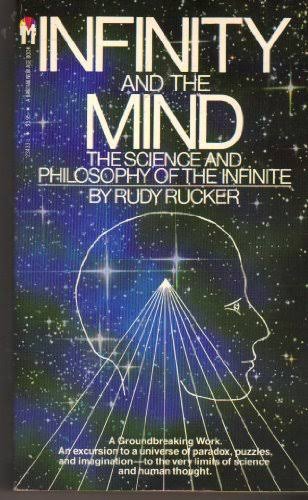Excerpts from Infinity and the Mind
Rudy Rucker

… This threefold division [of infinity] is due to Cantor, who, in the following passage, distinguishes between the:
- Absolute Infinite
- Physical infinities
- Mathematical infinities
The actual infinite arises in three contexts: first when it is realized in the most complete form, in a fully indepen dent other-worldly being, in Deo, where I call it the Absolute Infinite or simply Absolute; second when it occurs in the contingent, created world; third when the mind grasps it in abstracto as a mathematical magnitude, number, or order type. I wish to make a sharp contrast between the Absolute and what I call the Transfinite, that is, the actual infinities of the last two sorts, which are clearly limited, subject to further increase, and thus related to the finite,
PHYSICAL INFINITIES
There are three ways in which our world appears to be un bounded and thus, perhaps, infinite. It seems that time cannot end. It seems that space cannot end. And it seems that any interval of space or time can be divided and subdivided endlessly. We will consider these three apparent physical infinities in three subsections.
Temporal Infinities
One of the chief consequences of Einstein’s Special Theory of Relativity is that it is space-time that is fundamental, not isolated space which evolves as time passes. I will not argue this point in detail here, but let me repeat that on the basis of modern physical theory we have every reason to think of the passage of time as an illusion. Past, present, and future all exist together in space-time.
So the question of the infinitude of time is not one that is to be dodged by denying that time can be treated as a fixed dimension such as space. The question still remains: is time infinite? If we take the entire space-time of our universe, is the time dimension infinitely extended or not?

Spatial Infinities
Whether or not our space is actually infinite is a question that could conceivably be resolved in the next few decades. Assuming that Einstein’s theory of gravitation is correct, there are basically two types of universe: i) a hyperspherical (closed and
unbounded) space that expands, and then contracts back to a point; ii) an infinite space that expands forever. It is my guess that case i) will come to be most widely accepted, if only because the notion of an actually infinite space extending out in every direction is so unsettling.
The fate of the universe in case i) is certainly more interesting, since such a universe collapses back to an infinitely dense space-time singularity that may serve as the seed for a whole new universe. In case il), on the other hand, we simply have cooling and dying suns drifting further and further apart in an utterly empty black immensity … and in the end there are only ashes and cinders in an absolute and eternal night.
The question we are concerned with here is whether or not space is infinitely large. There seem to be three options: i) There is some level n for which -dimensional space is real and infinitely extended. The situation where our three-dimensional space is infinitely large falls under this case. ii). There is some n such that there is only one n-dimensional space. This space is to be finite and unbounded, and there is to be no reality to n + 1 dimensional space.
The situation where our three-dimensional space is finite and unbounded, and the reality of four-dimensional space denied, falls under this case. iii). There are real spaces of every dimension, and each of these spaces is finite and unbounded. In this case we either have an infinite number of universes, duoverses, triverses, etc., or we reach a level after which there is only one n-verse for each n.
Read more in his book Infinity and the Mind






























